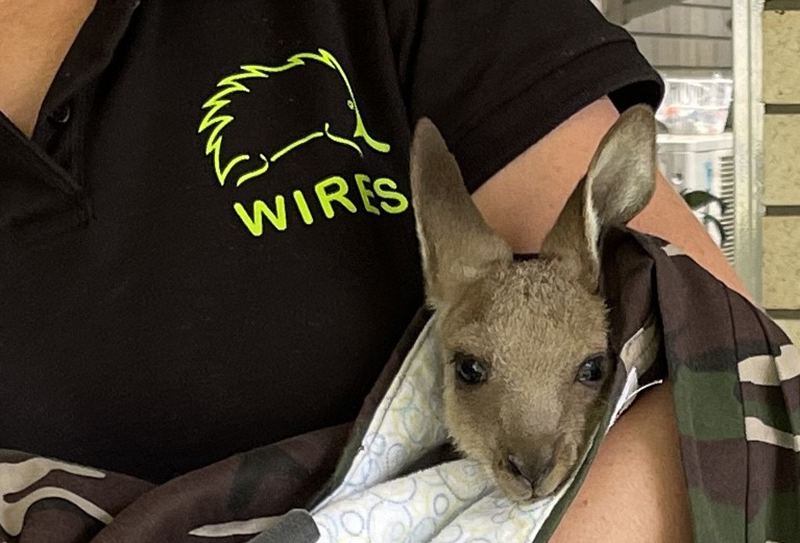2025 Mikla Lewis Grant - Gondwana Rainforest Trust
February 2026
For emergency rescue support 24/7 please call 1300 094 737

Flooding, heavy wind and rain can result in stress and shock for wildlife.
As storms and heavy rain continue to cause widespread flooding, we are receiving calls to assist animals impacted by the large areas of inundation and fast-flowing floodwaters. We ask that you please always follow the advice and directions from the relevant State authorities. For your own safety do not enter floodwaters at any time and if you are caught in a flood, call triple zero 000 for help.
At these times our rescue line can be extremely busy, but there are some simple things you can do to help.
Please keep an eye out for waterlogged animals. A waterlogged animal is completely saturated and often unable to move. They may be seeking shelter in unusual places.
Birds are often the most impacted by becoming waterlogged, unable to fly and seabirds and can be blown or swept off course and be found exhausted on beaches or even many kilometres inland.
If you find a bird in this state, and it is safe to do so, you can pick them up by gently wrapping them in a small towel or soft cloth with no loose threads. Then, take them inside and place in a ventilated box large enough for the bird to stand, place a soft cloth on the bottom of the box and let the bird warm up and dry out in peace and quiet.
After wild weather, you may also see freshwater turtles or other reptiles in unusual places. If a turtle’s shell is cracked or there is sign of injury, it’s advisable you take it to the nearest veterinarian. Otherwise, you can re-locate it near a safe freshwater source. Please be cautious with turtles and ensure you are releasing into the correct type of water. If you are unsure if you have found a marine or freshwater turtle, please get in touch with WIRES to confirm.
Many ground-dwelling species are at risk and seeking refuge, some may be displaced from their homes. If you know of any local wildlife, especially burrow-dwelling species, please keep alert. Be vigilant on the road and keep an eye out for wildlife.
Small possums and gliders may also be found under trees after severe storms – we suggest that you check the hollows of any fallen trees if it is safe to do so.
Bats and Flying-Foxes have been seeking refuge under verandas, house eaves and in open sheds. Please do not handle or attempt to rescue, please call WIRES 1300 094 737 and a vaccinated volunteer will rescue the bat.
Advice for helping wildlife during flood emergencies
1. Take domestic animals with you if you evacuate or keep cats indoors and dogs under control wherever possible so that wildlife can flee safely through your yard if needed.
2. Keep a cardboard box, gloves, mask, a cotton pillowcase and a few towel in the boot of your car in case you find an injured animal that you can safely contain without putting yourself in any danger.
3. If you rescue an animal, do not attempt to feed it and do not offer water unless instructed to by a trained wildlife carer or vet.
4. Please wrap rescued animals loosely, ideally in 100% cotton fabric or a cotton pillowcase with no loose threads, place it in a ventilated box with a lid and keep it in a dark, quiet place whilst waiting for a rescuer or for transport to the nearest vet.
5. Handling of wild animals should only occur in the course of containing the animal to reduce additional stress caused by proximity to humans. Please keep rescued wildlife well away from all domestic pets and children.
6. If you can safely take injured animals to your nearest vet please do so, as injured animals will require urgent vet assessment. If you can please also call WIRES to let us know which vet you’ve taken the animal to so we can follow up with vet to bring the animals into care when they are ready.
7. Do not approach any snakes, flying-foxes, large kangaroos, raptors or monitors as these must be rescued by trained specialists, for these species please call WIRES for rescue assistance on 1300 094 737.
8. It is imperative not to risk your life. Do not drive through or enter floodwaters.
Stay in touch and get our regular rescue stories, WIRES updates and a free copy of our 15 Ways to Help Wildlife ebook
February 2026
February 2026
February 2026
February 2026
January 2026
January 2026